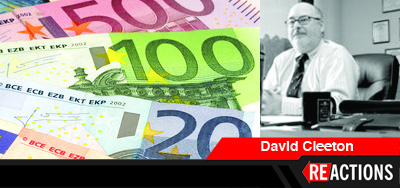The Swiss National Bank’s decision to remove the cap on the Swiss franc is being called one of the most dramatic currency intervention reversals in decades. Why would a move by a country to strengthen its own currency be considered so dramatic? It could be what the move implies for the euro and Western Europe’s finances, says Professor of Economics David Cleeton, co-chair of the Political Economy Interest Section of the European Union Studies Association.
Cleeton:
The move by the Swiss could be an anticipation that the value of the euro is going to fall. The euro has faced several crises since the large recession in 2008. It will face another now that Greece, which is in danger of defaulting on billions in loans, has elected an anti-austerity leader. In addition, the European Central Bank looks to be about to start up a program of quantitative easing which will be implemented by purchasing the sovereign bonds of euro governments.
Switzerland is not part of the European Union, and has its own strong currency – the Swiss franc – but the country holds a great deal of euros in reserves, many of them from the market interventions involving selling the Swiss franc. Like a lot of smaller countries, external trade is a significant portion of the economy. The majority of their exports and imports are transactions with neighboring countries such as Germany, France and Italy – all of which operate on the euro.
In 2011, when many European Union countries were struggling to recover from recession, the Swiss National Bank intervened to stop the Swiss franc from becoming too strong against the euro. If the Swiss franc became too expensive, then exports would suffer as the costs of Swiss goods in euro terms became higher.
This is similar to what China has done to hold down its currency over time. The Chinese also intervene in the market to keep the exchange rate from reflecting what a competitive market would set. When investor demand increases for a strong currency, like the yen or the Swiss franc, then the government may supply more to offset the demand without seeing an appreciation of the currency.
Because the Swiss have a high volume of exports, they take in a great deal of euros in exchange for these transactions. They have accumulated a lot of euros in their reserves. If the Greek elections have a conservative victor, that means Greece might proceed to default or ask for forgiveness on their borrowings, which would in turn cause the value of the euro to fall. That would be costly for the Swiss National Bank, whose reserves are dominated by euros.
The “cap” which held the strength of the Swiss franc in check is now gone. Investors will look to buy the stronger Swiss franc, and it could increase in value substantially compared to the euro.
Switzerland is in a unique position. It has a large banking sector and people see the Swiss franc as a benchmark for the maintenance of value. It punches above its weight. So not many other countries could really follow the example set by the Swiss.
That said, a 30 percent jump in the value of currency is no small matter. It will be interesting to see how much of an overreaction the markets have to this, and if Swiss exports will suffer as much as some predict.
Personally, when I heard the news, I looked in my drawer at home where I keep currency from my travels. Looks like my Swiss francs have increased in value enough to tempt me to convert them to euros next time I visit Paris and enjoy a reward in terms of a couple of good meals.

